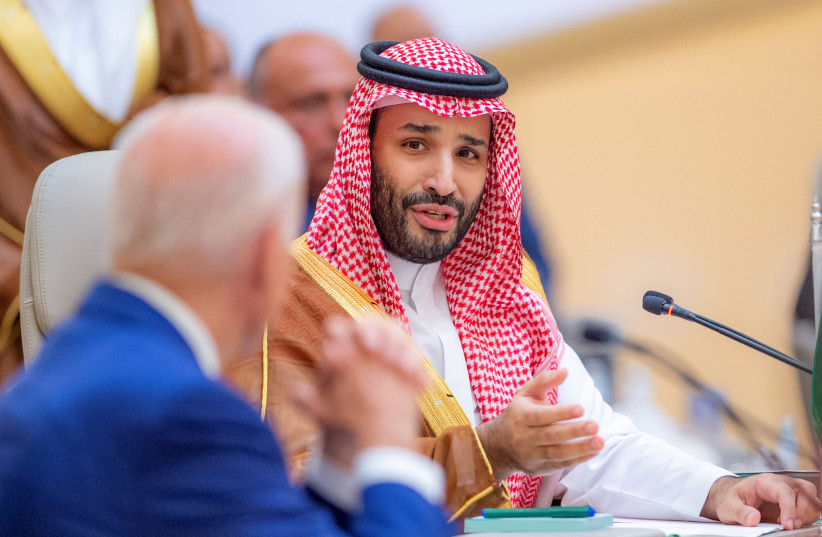The timing of Hamas’s terrifying attack reinforced the belief that the terror organization and Iran sought to disrupt the normalization talks between Israel and Saudi Arabia, a claim that was also raised by President Joe Biden.
Certainly, Hamas was driven by the perception that normalization between Saudi Arabia – the leading Sunni state, custodian of Islam’s two holy sites – and Israel would be a symbolic bow to Israel’s legitimacy and sovereignty, potentially strengthening the Palestinian Authority (PA).
It’s worth mentioning that the normalization negotiations likely included a defense pact between Washington and Riyadh and cooperation in civil nuclear development, significantly altering the regional strategic balance against Iran.
A few days after the conflict began, Saudi officials announced the suspension of talks with the United States regarding normalization with Israel. This anticipated declaration was carefully worded to avoid halting the process entirely, simultaneously signaling Riyadh’s current distancing from Jerusalem.
The announcement from the White House at the end of October, where Saudi Crown Prince Mohammed bin Salman(MBS) expressed interest in continuing talks post-war, also affirmed that Riyadh wasn’t hastily abandoning the American assurances discussed in the normalization talks between the countries.

The main concern
The central concern of the Gulf states is preventing Iran and Hamas from dictating the Palestinian issue and thus overriding Arab influence. The Gulf Arabs strive to settle this through condemnations toward Israel and a general call not to escalate the situation, reaching a ceasefire. Despite harsh Saudi criticism towards Israel, there’s also criticism directed at Hamas in Saudi media outlets.
The main worry for the Gulf states is the spillage of the conflict into their territory. Yemen, where Iran manipulates the Houthi rebels against Israel, could lead to an escalation of hostilities and expose them to Houthi fire. Moreover, Gulf countries host American military bases on their soil that are targeted by Iran and its proxies.
For Saudi Arabia, the substantial deployment of American military forces alongside Israel is an encouraging sign and signals a greater possibility of US backing if they were to be attacked by Iran.
Roughly a month after the war, as the conflict in Gaza stirred protests across the Arab world, Saudi Arabia hosted a joint emergency summit of the Arab League and the Organization of Islamic Cooperation. Notably present were Iran’s President Ebrahim Raisi – marking the first visit by an Iranian president to the kingdom in many years – and Syria’s President Bashar Assad.
MBS seized the summit to underscore his kingdom’s renewed status and its pivotal role in leading the Arab sphere. He aimed to demonstrate interest and engagement in the crisis, preventing Iran from monopolizing support for Hamas or adopting a strong stance against Israel and the US. This took place amidst the broader context of pursuing regional détente, which hinges on the reshaped relationship between his country and Iran.
Reports emerged that the UAE, and likely Saudi Arabia, thwarted a proposal to compel nations maintaining ties with Israel to sever them, restrict Israeli flights over their territories, and disrupt oil supply to Israel’s allies, reminiscent of the famous oil embargo after the Yom Kippur War.
ISRAEL MIGHT find some satisfaction in the summit’s outcomes and the general conduct of Saudi Arabia and the Arab states that have relations with Israel. This suggests their shared desire to weaken Hamas, restrain Iran’s ambitions, and sustain normalized relations with Israel. However, the relatively distant stance of Arab nations towards the Gaza crisis also indicates that expectations regarding their involvement in post-Hamas security arrangements and Gaza’s governance should be adjusted.
Shaping a post-Hamas era
Amid the Israel-Hamas conflict, Saudi Arabia and the United Arab Emirates, aspiring to maintain their leading roles in the Arab world, have remained relatively passive. Apart from formal statements and humanitarian aid, they leave the diplomatic field to Qatar, while they continue to depend on American defense against possible Iranian strikes.
Nevertheless, both Riyadh and Abu Dhabi might help shape the post-Hamas era, given that Hamas will no longer be sovereign in Gaza, coupled with a resumption of an Israeli-Palestinian political process involving the PA, while ensuring substantial US involvement in the region.
Furthermore, although it’s hard to envisage immediate progress in Israel-Saudi normalization, Saudi Arabia leaves the door slightly open. In this context, the Palestinian component in any potential normalization negotiations with the kingdom after the war will have more significance than previously envisaged before Hamas’s attack.
The Gulf states witness the US military, economic, and diplomatic assistance to Israel in its time of need – factors that might encourage them to edge closer to Israel and the US in the post-war era. Already, the joint effort of Saudi Arabia, the US, and Israel against the Houthi missile attacks indicates successful cooperation that could expand.
The writer is a senior fellow at the Institute for National Security Studies, an independent think tank affiliated with Tel Aviv University, and a non-resident scholar at the Middle East Institute.
